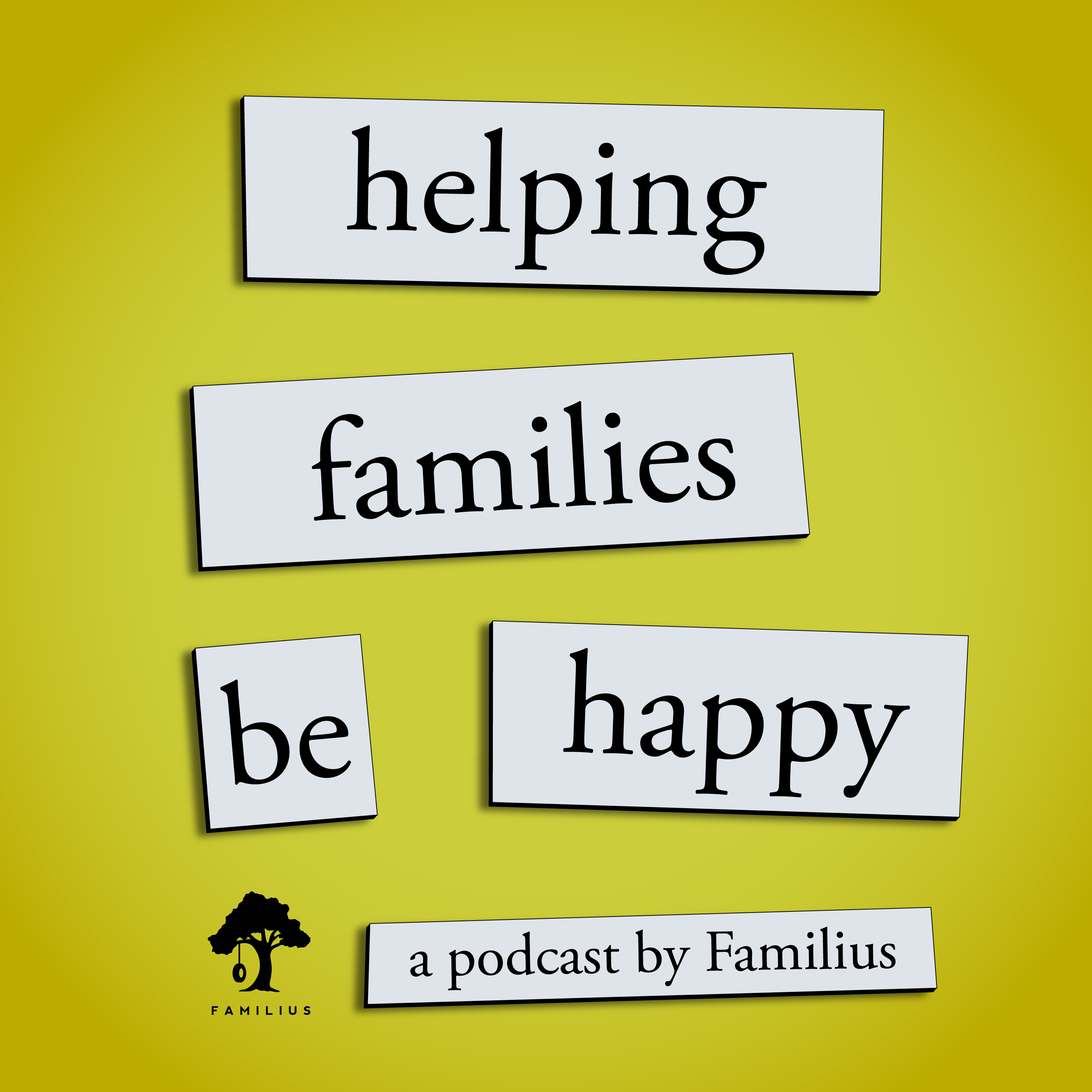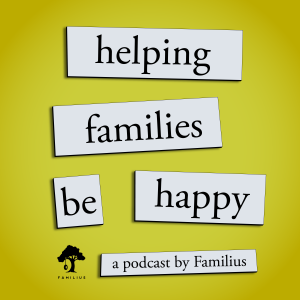
14.4K
Downloads
216
Episodes
With help from guest authors, experts, and community and business leaders, the Familius Helping Families Be Happy podcast explores topics and issues that connect families to the nine habits of a happy family: love, play, learn, work, talk, heal, read, eat, and laugh together.
Episodes

Wednesday Dec 20, 2023
Literary Liberties: Balancing Freedom to Read and Parental Concerns with Sarah Smith
Wednesday Dec 20, 2023
Wednesday Dec 20, 2023
On today's episode of the "Helping Families Be Happy" podcast, host Christopher Robbins, co-founder of Familius Publishing, husband, father of nine, author, fisherman, backpacker, and aspirational musician based in the Central Valley of California, talks to Sarah Smith; a distinguished district librarian from California's Central Valley about books and the current book banning trend within the United States.
Having served as a high school librarian and English teacher, Sarah's passion now extends to professionally reviewing manga and graphic novels for esteemed publications like Booklist and School Library Journal. she has penned articles for California English and Diamond Bookshelf, enhancing our understanding of the written word. Her voice has enriched podcasts such as School Librarians United and The Literacy Advocate, and her expertise has been showcased at conferences hosted by the American Library Association and the School Library Journal Summit.
Episode Highlights:
- 01:58 Christopher opens the dialogue with a reflection on the current state of book banning and censorship in the United States, emphasizing its unprecedented scale and acknowledges the need to balance the protection of our right to read with parental concerns over potentially objectionable content.
- 02:34 Statistics reveal a significant rise in challenged titles in libraries, with a shift towards collective challenges on multiple books rather than individual titles.
- 04:22 Sarah describes the issue of book banning as a significant element in a wider cultural conflict, particularly as a means to challenge public education. She notes that the pandemic, by bringing school into the home, gave some parents a closer look at educational content, which has spurred a pushback against certain materials.
- 05:27 Sarah reveals a startling statistic from a recent study showing that a majority of the book challenges can be traced back to a relatively small number of individuals, suggesting the influence of a vocal minority rather than a widespread movement.
- 07:38 Christopher seeks Sarah’s insight on how parents can address concerns about content their children are exposed to in school libraries.
- 09:06 Sarah touches on regional differences in content appropriateness, particularly within California's diverse political landscape. She discusses the challenges librarians face in ensuring age-appropriate content and the reliance on various tools and resources to assist in book selection.
- 10:49 The goal of reconsiderations process is to approach concerns objectively and fairly, without succumbing to emotional or biased judgments, says Sarah.
- 11:56 Christopher clarifies the objective criteria in place for parents to submit concerns about content and the inclusive review process involving various community members.
- 13:19 Christopher discusses the variability of policies across districts and states, and the importance for parents to be informed about their school’s specific policies.
- 13:35 Sarah advises parents to check school board policies on their school's website, typically found under the instruction section, to understand the policy regarding book challenges.
- 14:26 Sarah emphasizes the importance of civility when parents address concerns with schools, suggesting that a polite approach is more effective.
- 16:34 Sarah introduces the idea of parents discussing content limitations directly with libraries, potentially preventing the need for book removals. She shares a personal anecdote about respecting a parent's request to restrict specific genres for their child and notes that this is a right parents have.
- 18:51 Christopher also discusses cultural literacy, encouraging exposure to a broad range of literature, music, and film to enrich children’s understanding of the human experience.
- 20:10 On constitutional aspect, Christopher questions how current cultural conflicts and legislation align with the freedom of speech and the freedom to read as guaranteed by the First Amendment.
- 21:27 Sara mentions guidance issued by the California District Attorney in June, reminding schools of their obligation to follow due process when considering the removal of books, underlining potential consequences for failing to do so.
- 22:46 Christopher inquiries about historical precedents for comic censorship, leading to a discussion on the Comics Code Authority established in response to accusations that comics were contributing to juvenile delinquency.
- 23:40 Sara explains the self-regulatory measures of the comics industry to avoid Congressional censorship and how the 1980s saw a shift with publishers choosing to ignore the Comics Code to produce content for mature audiences.
- 25:54 Sarah stresses the diligence that goes into selecting books for libraries, pointing out that professional reviews are a resource for librarians and can be a tool for parents as well. She mentions that professional reviews are available for parents to check if a book is age-appropriate and suggests that these resources can also guide parental choices.
- 28:16 Christopher discusses the importance of trade publications in the library collection development process and their availability on platforms like Amazon.
Key Points:
- Christopher and Sarah explore the concerning trend of book banning in the U.S., discussing the need to find a balance between protecting the freedom to read and addressing parental concerns over certain educational content.
- Sarah offers insights on the book selection process in libraries, emphasizing the role of professional reviews and trade publications to ensure age-appropriateness, and suggests that direct communication between parents and libraries can pre-emptively address content concerns.
- The conversation also addresses the constitutional implications of book banning, historical censorship in comics, and the importance of cultural literacy, underscoring the significance of due process and civility in the discourse around library content and book challenges.
Tweetable Quotes:
- "Unprecedented scale of book banning in the U.S. calls for a balance between our right to read and addressing parental content concerns." - Christopher Robbins
- "A vocal minority, not a widespread movement, often drives the rise in book challenges." - Sarah Smith
- "Civility and direct communication with libraries can address content concerns more effectively than book removals." - Sarah Smith
- "Cultural literacy is enriched by exposure to a broad range of literature, music, and film." - Christopher Robbins
Resources Mentioned
- Helping Families Be Happy Podcast Apple
- https://www.graphiclibrary.org/about-me.html
- Podcast Editing

No comments yet. Be the first to say something!